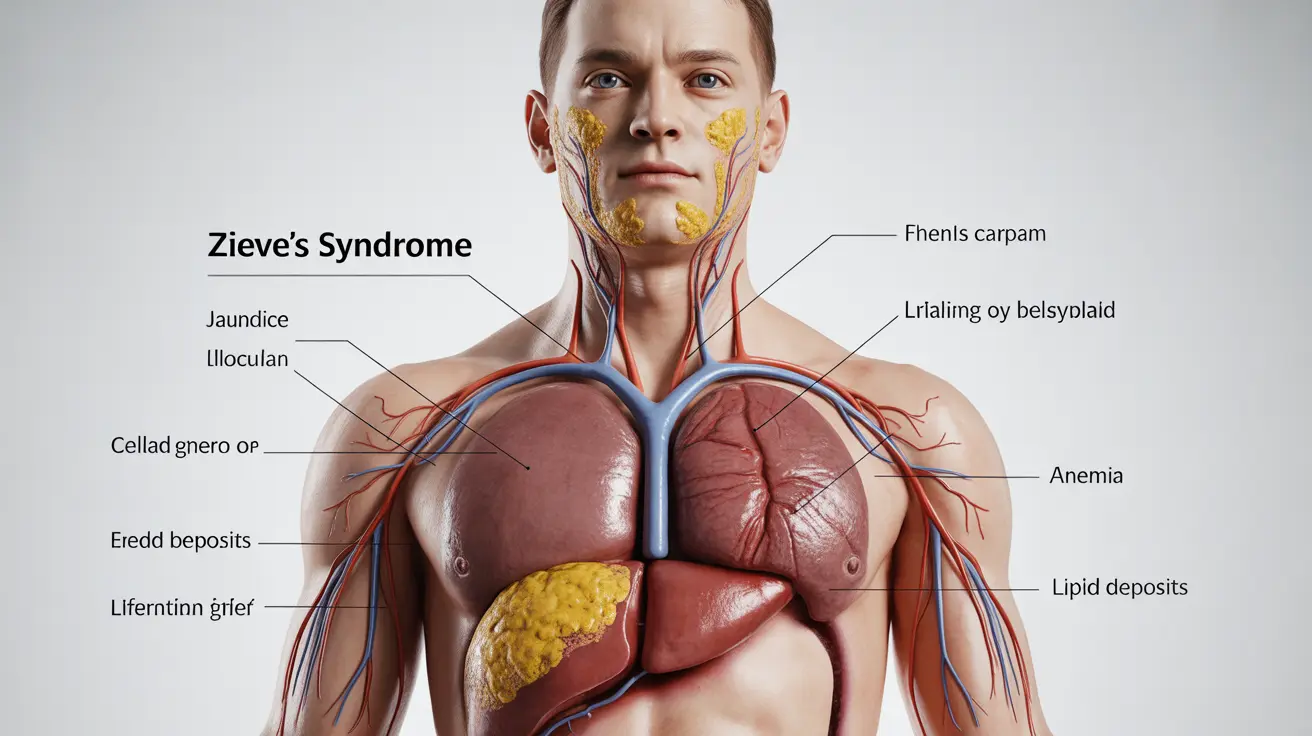Zieve's syndrome is a complex medical condition that primarily affects individuals with a history of chronic alcohol use. This distinctive syndrome combines three main features: hemolytic anemia, jaundice, and high blood fat levels, typically occurring in the context of alcohol-related liver disease. Understanding its causes, symptoms, and treatment options is crucial for both healthcare providers and those affected by this condition.
While relatively rare, Zieve's syndrome requires prompt medical attention and lifestyle modifications for successful management. This comprehensive guide explores the essential aspects of the condition, from recognition to recovery, with a focus on evidence-based treatments and prevention strategies.
Understanding Zieve's Syndrome
Zieve's syndrome occurs when chronic alcohol consumption leads to specific changes in the body, particularly affecting the liver and blood cells. The condition is characterized by simultaneous manifestation of several medical issues that can significantly impact a person's health and quality of life.
Key Components of the Syndrome
The three primary components of Zieve's syndrome include:
- Hemolytic anemia (destruction of red blood cells)
- Hyperlipidemia (elevated blood fat levels)
- Jaundice (yellowing of skin and eyes)
Recognizing the Signs and Symptoms
Early recognition of Zieve's syndrome symptoms is crucial for timely intervention and improved outcomes. Common symptoms include:
- Yellowing of skin and eyes
- Fatigue and weakness
- Abdominal pain
- Dark urine
- Pale stools
- Unexplained weight loss
- Shortness of breath
Diagnosis and Medical Evaluation
Healthcare providers use various diagnostic tools to confirm Zieve's syndrome and differentiate it from other liver conditions. These typically include:
- Blood tests to assess liver function
- Complete blood count to evaluate anemia
- Lipid panel to measure blood fat levels
- Imaging studies of the liver
- Medical history evaluation, particularly alcohol use patterns
Treatment Approaches
The cornerstone of treating Zieve's syndrome involves several key strategies:
Primary Interventions
- Complete alcohol cessation
- Nutritional support and supplementation
- Management of underlying liver disease
- Regular medical monitoring
Supportive Care
Additional treatments may include:
- Vitamin supplementation (particularly B-complex vitamins)
- Fluid and electrolyte management
- Treatment of complications as they arise
- Psychological support for alcohol cessation
Prevention and Long-term Management
Preventing Zieve's syndrome primarily involves addressing its root causes and maintaining healthy lifestyle choices:
- Abstaining from alcohol consumption
- Regular medical check-ups
- Balanced nutrition
- Stress management
- Support group participation
Frequently Asked Questions
How can Zieve's syndrome be cured and what is the role of alcohol abstinence in recovery?
Zieve's syndrome can be effectively managed through complete alcohol abstinence, which is the primary treatment. Recovery typically begins within weeks of stopping alcohol consumption, accompanied by appropriate medical support and nutritional supplementation. Alcohol abstinence is crucial as it allows the liver to heal and prevents further damage.
What are the main symptoms and signs that indicate someone might have Zieve's syndrome?
The main indicators include jaundice (yellowing of skin and eyes), fatigue due to anemia, and symptoms related to elevated blood fats. Patients may also experience abdominal pain, dark urine, and general weakness. These symptoms typically appear in individuals with a history of chronic alcohol use.
How is Zieve's syndrome diagnosed and differentiated from alcoholic hepatitis?
Diagnosis involves comprehensive blood tests checking for anemia, elevated blood fats, and liver function. The presence of all three characteristic features (hemolytic anemia, jaundice, and hyperlipidemia) helps differentiate it from simple alcoholic hepatitis. Additional testing may include imaging studies and detailed medical history evaluation.
What treatments besides stopping alcohol are used to manage severe cases of Zieve's syndrome?
Treatment may include vitamin B supplementation, nutritional support, fluid and electrolyte management, and treatment of specific complications. Some patients may require hospitalization for close monitoring and management of severe symptoms. Medical therapy is tailored to individual patient needs and severity of the condition.
Can Zieve's syndrome be prevented, and what lifestyle changes reduce the risk of developing it?
Prevention primarily focuses on avoiding alcohol consumption and maintaining a healthy lifestyle. Key preventive measures include complete alcohol abstinence, regular medical check-ups, proper nutrition, and stress management. Joining support groups can help maintain sobriety and prevent recurrence.




